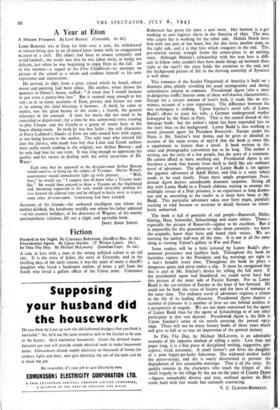Fiction
A Gtiu. in love with a man of the wrong political colour is an old tale. It is the story of Juliet, the story of Gryseyde, and in the thrilling days of the early cinema it was the story of many a sheriff's daughter who loved a handsome outlaw, of many a girl from the South who loved a gallant officer of the Union army. Constance Robertson has given the story a new twist. Her heroine is a girl working to save fugitive slaves in the America of 185o. The man who courts her is working for the other side. Mahala North loves him with one part of her heart, but she also loves another man, on the right side, and it is that love which conquers in the end. This pre-marital eternal triangle forms, the centre-piece in an exciting story. Although Mahala's relationship with her true love is diffi- cult to follow (why couldn't they have made things ,up between them right at the start?) the story holds the attention to the end, and the background picture of life in the thriving township of Syracuse is well done.
This iomance of the Scarlet Pimpernels of America is built on a dramatic plan, plainly revealing the usual incongruities and daring coincidences natural to romance. Presidential Agent (also a story of dangerous traffic) betrays none of these well-known characteristics. Except for a certain amount of hero's luck, it reads like an eye- witness account of a true experience/ The difference between the two techniques is striking. Upton Sinclair's novel tells of Lanny Budd's efforts to trace his wife, a German underground worker kidnapped by the Nazis in Paris. That is the central thread of this 600-page book: but the author's talent has been expended less on the story than on the background. Lanny Budd is also working as secret personal agent for President Roosevelt: Europe under the Nazis is Mr. Sinclair's true theme, and he gives so, detailed an account of the main events of 1937-8 that the book is more like a supplement to history than a novel. A book written in this exact and photographic convention has to be long. The author is writing, not the story of a few people, but the story of a continent. He cannot afford to leave anything out. Presidential Agent is not therefore a work that hurries from thrill to thrill like any ordinary novel of adventure. The adventure of Lanny Budd is set against the gigantic adventure of Adolf Hitler, and that is a story which needs to be read slowly. From these ample proportions Presi- dential Agent derives considerable dramatic suspense. Sitting •all day with Lanny Budd in a French château, waiting to attempt the midnight rescue of a Nazi prisoner, is an experience as long drawn- out and as unsettling to the reader as it must have been to Mr. Budd. This particular adventure takes over forty pages, painfully exciting to read because so accurate in detail, because so relent- lessly unhurried.
The book is full of portraits of real people—Roosevelt, Hitler, Goring, Hess, Schneider, Schuschnigg and many others. These— especially the picture of Roosevelt—appear to be excellent. But it is impossible for this generation to value them correctly : we knew the originals, knew their faces and heard their voices. We are meeting the author half-way all the time. It is not at all the same thing as viewing Tolstoi's gallery in War and Peace.
Some readers will be a little irritated by Lanny Budd's phe- nomenal prescience and faultless luck. Throughout the book he furnishes reports to the President, and his warnings are right to a hair's breadth every time. Throughout the book be plays a dangerous game and never makes a slip. It must be recognised that this is part of Mr. Sinclair's device for telling the full story. If the presidential agent had blundered, we could never have had this picture of the inner side of Fascist Europe. For us Lanny Budd is the eye-witness of Europe in the hour of her betrayal. He could not be both the voice of history and the hero of romance at the same time. The ordinary novel of adventure requires a climax in the life of its leading character. Presidential Agent depicts a number of climaxes in a number of lives set one behind another in a perspective of- tragedy. We are not more concerned for the agony of Lanny Budd than for the agony of Schuschnigg or of any other participant in that vast disaster. Presidenttdl Agent is the fifth in Upton Sinclair's series of six novels covering the period 1913T 1940. There will not be many history books of those years which will give so full or so true an impression of the general picture, In This Thy Day, by Michael McLaverty, is an admirable example of the opposite method of telling a story. Less than zoo pages long, it is a fine piece of disciplined writing, suggestive, Or- ceptive, vivid, economic. A small farmer's son loves the daughter of a poor happy-go-lucky fisherman. His widowed mother holds the purse-strings, and she is sourly determined to prevent the degradation of this unsuitable marriage. That is all the story. Its quality consists in the characters who touch the fringes of this small tragedy in the village by the sea on the coast of County Down —figures remarkably diverse and true, outlined against an- Nish scene built with few words but curiously convincing.
V. C. CLINTON-BADDELEY.




























 Previous page
Previous page